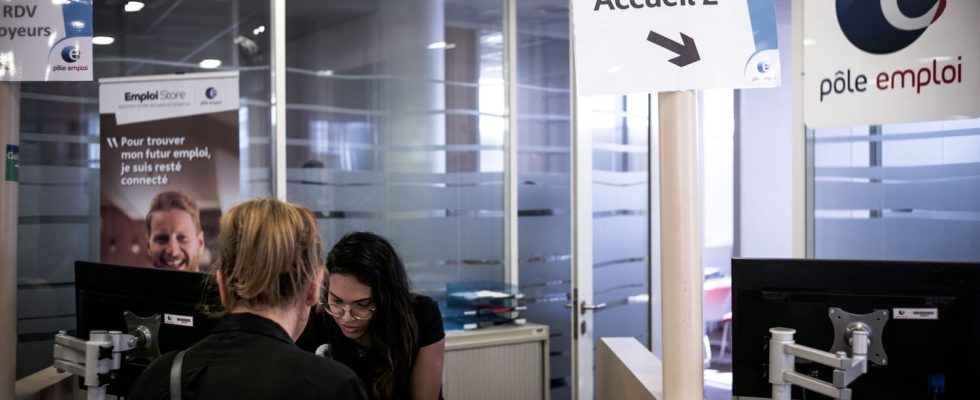France Travail, here is the name of the entity dedicated to replacing Pôle emploi in 2024. The Minister of Labor must present this Wednesday, April 19, 2023 a decisive report on this project costing more than 2 billion euros.
Between 2.3 and 2.7 billion euros. Here is the planned budget to replace Pôle emploi in 2024 with a new structure: France Travail. This long-shifted project must fulfill Emmanuel Macron’s campaign promise: to achieve full employment by 2027. In his program, full employment would be achieved with an unemployment rate of 5%, whereas it is currently at 7.2%. The timing of his presentation is clear, the government wants to move on after the stalemate of the pension reform. The Minister of Labor, Olivier Dussopt, must present a report on this project on Wednesday April 19, 2023.
The President of the Republic wants to create a one-stop shop to increase efficiency. The idea is similar to that of Nicolas Sarkozy in 2008: Pôle emploi resulted from the merger between ANPE and Assedic. But other players still exist and do not necessarily communicate together, such as departmental councils or local missions. Government training is thus offered in duplicate by several services. The Head of State therefore wishes to modify this “administrative mille-feuille” with the creation of a single service called France Travail. This future bill is part of the “pact for life at work” announced by Emmanuel Macron during his televised speech on April 17. This “pact” includes a law on value sharing, which should make it possible to generalize profit-sharing or participation schemes in companies, the France Travail project and a future law on working conditions and the employment of seniors. .
France Work, what is it?
France Travail is the result of an eight-month project led by the High Commissioner for Employment and Business Commitment, Thibaut Guilluy. According to him, France Travail should be the “gateway for all job seekers” and “the French team for integration, training and employment”. It is a question of simplifying the steps of the people in search of employment, but also those of the companies. This will not, however, merge the various employment actors, but group them together in a hierarchy that is supposed to be clearer: Pôle emploi will become France Travail, which will be at the top of the network, the local missions will be renamed “France Travail jeunes” and Cap emploi in “France Travail handicap”. France Travail must be the first entry point before being directed to the right actor. Data sharing would then be broader and more effective, according to the ministerial report.
What are the differences with Pôle Emploi?
Especially coordination. Since its appearance in 2008, Pôle emploi has failed to create closer links with the various employment actors. France Travail must therefore “promote a real dialogue between the various actors in order to inform decision-making”. The bet is substantial in the face of the administrative octopus that is the current system. Going to a France Travail agency will therefore not be out of place. The agencies will still be in operation, but with a new internal system. The name Pôle emploi is therefore destined to disappear, but it is above all its communication that will be transformed.
For companies in contact with Pôle Emploi, the report recommends creating a digital platform with the designation of a fixed contact person per company to improve the speed of recruitment. These companies will also be offered training for access to training and the setting up of the “France Travail academy” dedicated to centralizing information resources.
RSA beneficiaries will have to do “hours of insertion”
The France Travail report is accompanied by a section on recipients of the RSA (revenu de solidarité active). A system tested since April sees 40,000 of them benefit from enhanced support from their Pôle Emploi adviser. These employees will see their number of beneficiaries, for whom they are responsible, decrease in order to improve the quality of monitoring. The government wishes to take advantage of its future bill to generalize this experiment. These hours of integration correspond to fifteen hours of training, CV workshops or internships to be carried out under penalty of losing part of their RSA (currently set at 607 euros for a single person).
The report provides the timetable for this future employment reform. The experiments carried out in certain Pôle emploi must continue until the end of 2023 to lead to the gradual commissioning of France Travail from 1 January 2024. The year 2026 should mark the definitive transformation of Pôle emploi into France Travail. But this is conditional on the future legislative progress of the project and its passage through Parliament.
